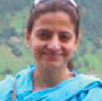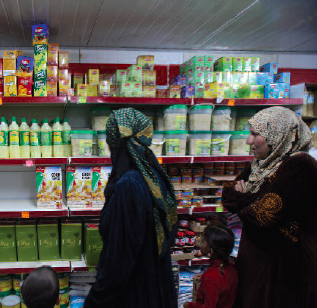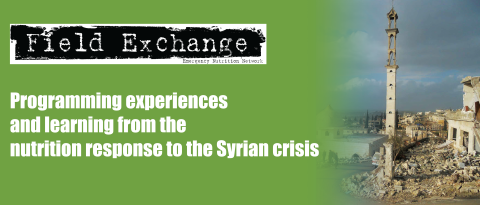A day in the life of a WFP field monitor working in the Syrian refugee camps in south-eastern Turkey
 By Afaf Shasha
By Afaf Shasha
Afaf Shasha is Field Monitor Assistant at the World Food Programme (WFP). She holds an MA from the Department of International Relations at Bilkent University, Turkey. She has a strong continuing interest in human rights and conflict resolution and an equally strong desire to see progress towards a sustainable global peace.
As a WFP field monitor, my job is to assess the food security situation in the camps for Syrian refugees specifically in the Hatay region. We need to know if they are getting the food they need and if their children are receiving the appropriate nutrition and how we can improve their access to food. That requires me to spend many hours in these camps mixing with refugees in their tents, which greatly contrasts to what I have done in my previous jobs. For years, I worked in a luxurious office with a multinational company but today as I stand in the camps, with displaced people forced out of their homes and living in tents waiting to hear of any news from home, I cannot help but draw comparisons between the two lives. In contrast to business meetings in fancy conference rooms in comfortable surroundings, I am now in the field inside the refugee camps, working with the most vulnerable displaced people and I do feel that I have lived two lives, which represent two different realities that are difficult to imagine existing in the same era of history.
At the camps, officially designated in Turkey as ‘‘guest tent cities,” the first scene is the crowd of children, who make up almost half of the camp’s population, playing on the ground, looking after their younger siblings or just out of their classes and running to us to practice the new Turkish words they have learnt. I speak with newly arrived 12-year old twins, Hasan & Hussain, one tall with fair skin and the other short with darker skin. They are sitting in their tent with their parents, eating oil and zaater for breakfast. A 10-year old girl with beautiful grey eyes, Razan, wants to become an architect so she can build her own house. She does not enjoy living in tents and she is an orphan. I have also spoken with several 18 year old young men who ran away from Syria, fleeing military service so they could continue their education.
Many of the girls and women, from under the age of 18 to over 40, are pregnant. Some of the mothers have a dozen or more children and even in their mid-thirties, some are grandmothers. Of course, health care and nutrition are their main needs.
 Chatting with women carrying their babies while shopping, I check on how they breastfeed and how many times the baby receives milk per day. Some women mention how keen they are on breastfeeding at least until the sixth month. Others say that due to the stress and lack of sufficient food, they lack breastmilk and totally depend on infant formula and complain of its prohibitively high price.
Chatting with women carrying their babies while shopping, I check on how they breastfeed and how many times the baby receives milk per day. Some women mention how keen they are on breastfeeding at least until the sixth month. Others say that due to the stress and lack of sufficient food, they lack breastmilk and totally depend on infant formula and complain of its prohibitively high price.
The most gratifying scene, in my opinion, is seeing women doing their own shopping using WFP/TRC electronic food vouchers. WFP often uses vouchers to provide assistance in all camps in Turkey. It provides people with more choice and they can buy fresh food such as fruit, vegetables and milk that are not normally included in conventional food rations.
Vouchers also inject money into the local economies of host countries and help refugees develop financial awareness and planning. It encourages better management of the food budget.
Some of my tasks such as monitoring the families after they have received and redeemed their food vouchers are not easy. It requires special effort with the people who may not feel relaxed or confident enough to answer questionnaires because some of the refugees feel that any candid response could have negative impacts on the assistance that they receive. We, as field monitors, have to explain the purpose of providing feedback on food availability in the market and if the family members are receiving the nutritious food that their bodies need.
The most challenging question that we ask Syrian refugees is what is the list of the foods they ate in the previous week, but the answers are crucial data for WFP evaluations of the nutritional status in the camp.
When asking them if they are eating differently from what they used to eat in Syria, the ‘guests’ often mention that can rarely eat their favorite foods. The vast majority - if not all - are very satisfied with the e-food card which allows them to buy the type of food of their own choosing. While grateful, beneficiaries do not like the provision of hot meals (used at the beginning of the crisis), since the food, did not for the most part, suit their taste. Bread is important in their diet. Large extended families with many adults consume lots of bread and as this item is not so cheap, it can be hard to meet their demands but the families are thankful to whoever supports them.
Refugees in many cases are just happy to chat with an Arabic speaker to share their feelings and worries; some get very homesick, while others seem to have adapted to camp life. Every number that makes up the statistics on Syrian refugees is actually a life story for a WFP monitor, for someone whom we might meet and talk to on a daily basis. As WFP field monitors, our role is to check on how balanced their diet and nutrition consumption is, while at the contracted market, we inspect the prices, and the proper quality, variety and validity of sold items to ensure equal accessibility for all the Syrian beneficiaries.
Being a displaced person is painful but we do the best we can to make life more comfortable for Turkey’s Syrian ‘guests’.


